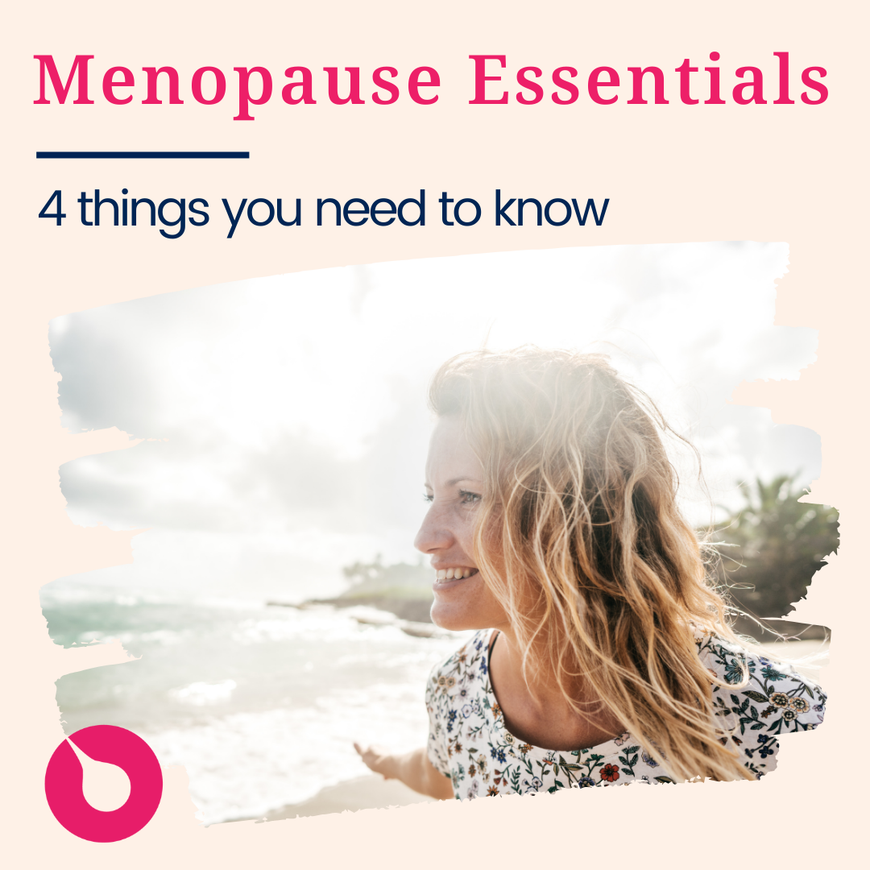By Nathalie Daudet
Menopause is just another piece of a woman’s reproductive journey, and it presents a transition time - just like puberty or childbirth. But what is it?
Firstly, we need to clarify the difference between Menopause and Perimenopause.
- Perimenopause is the period of time before menopause when your body is actively moving towards menopause. This is when you will start to experience symptoms and see changes in your cycle.
- You have reached menopause when you have not had a period for 12 months consecutively.
If you've charted your fertility up until your cycles begin to change, many of the skills you already use will come in handy.
When does perimenopause start?

Perimenopause typically begins in a woman’s late 40s, but it's considered normal to start perimenopause any time starting at 35.
It's characterized by a series of cycle changes and symptoms. Tracking your cycle during this time can be incredibly valuable as you will be able to monitor things like cycle length, ovulation, and luteal phase length.
If you're tracking your cycle, it's much easier to be in the driver's seat rather than just a passenger taking an unknown route.
Cycle changes in perimenopause include more frequent anovulatory cycles, cycle irregularity, and a shorter luteal phase.
While tracking your cycle, you can also begin to track the presence of other symptoms that may indicate that the process of perimenopause has begun. Here are common are symptoms that are easy to track in your cycle chart:
- Premenstrual syndrome (PMS)
- Cramps
- Hot flashes
- Night sweats
- Difficulty sleeping
- Changes in libido
- Change in menstrual flow
- Headaches
- Weight gain
- Swollen breasts
Most people don't experience all of these symptoms, so the best starting point is to chart any of the symptoms you notice as you notice them.
What’s up with hormones during perimenopause?

The ovaries, sensing a decline in ovarian reserve, begin maturing and attempting to release more eggs during each ovulation event (twins can be more common during this phase of life). One article calls this the ovaries’ “frustrating grand finale” (Dr. Jerilynn Prior, 2019). This extra activity causes higher levels of estrogen, unopposed by the calming effects of progesterone. We know estrogen unopposed by progesterone can cause some unpleasant side effects, including increased menstrual flow, fibroids, tender breasts, and PMS.
Progesterone is our anti-stress and calming hormone. When progesterone levels are low, and estrogen is high, this can increase anxiety and feelings of stress. During perimenopause, we may not feel like we can cope with stress like we used to. Naturopath and women’s health expert Lara Briden suggests several strategies to help your system adapt during perimenopause. This includes
-
Stabilize your nervous system with magnesium and the amino acid taurine—two nutrients that can relieve hot flashes and improve sleep.
-
Reduce histamine and mast cell activation to reduce your sensitivity to estrogen.
-
Prevent estrogen from spiking too high by reducing alcohol, supporting a healthy gut microbiome, and taking supplements such as iodine and calcium-d-glucarate.
Hormone replacement therapy
There has been a long-standing debate about hormone replacement therapy (HRT) and its value for perimenopausal women. Studies have shown the reduction of symptoms as well as significant risks of hormone replacement therapy, so it's important to educate yourself around your decision as well as the type of HRT you decide to take, this way you can make an informed decision.
The Centre for Menstrual Cycle and Ovulation Research (CEMCOR) takes the stance that bioidentical progesterone can be beneficial in reducing symptoms and balancing unopposed estrogen. One trial done by CEMCOR demonstrated bio-identical progesterone contributed to a reduction in hot flashes, and another showed a decrease in sleep-related issues. One thing is sure though, not all HRT is created equal, and side effects vary depending on which you decide to take. As with other hormone balance issues, addressing the root cause of the problem will be the most sustainable long-term at creating any change in symptoms.
A note on the societal pressures of age

Women will spend about one-third of their life post-menopausal. Let’s challenge the long-held notion post-menopausal women can’t offer anything of value to the world.
In our culture, a woman’s worth is often determined by their ability to procreate. When we no longer have this ability, or we feel like our fertility is dwindling, that can be directly attached to our worth.
The journey of perimenopause, menopause, and post-menopause is to come into your own and to measure your worth internally rather than relying on external validation. For example, you may want to start thinking about what fills your own cup, rather than doing things only for the benefit of others - not to say you should stop helping others! Older women have wisdom, experience, and steadiness in their sense of self that is incredibly valuable to our families and communities.
For further information regarding HRT or any other supplements mentioned in this article, please consult with your doctor or another healthcare provider.
Works Cited
- https://www.cemcor.ubc.ca/resources/perimenopause-ovary%E2%80%99s-frustrating-grand-finale
- https://www.larabriden.com/benefits-of-taurine-for-womens-health/
- https://pubmed.ncbi.nlm.nih.gov/21271347/
- https://www.larabriden.com/the-curious-link-between-estrogen-and-histamine-intolerance/
- https://www.larabriden.com/iodine-for-breast-pain-ovarian-cysts-and-pms/
- https://www.cemcor.ca/

Nathalie Daudet is a social worker and FEMM instructor based in Winnipeg, Canada. She discovered fertility awareness after searching high and low for a non-hormonal method of birth control. After learning the magic of fertility awareness and the gift of body literacy, she decided to pursue formal fertility awareness training and share the knowledge of fertility awareness with women looking for a natural birth control option. Fertility Awareness Project is the hub for Nathalie’s FEMM classes in both group and individual formats, online and in person in Winnipeg. If you love this post and would like to thank Nathalie, shop Tempdrop with Nathalie's unique referral link.

